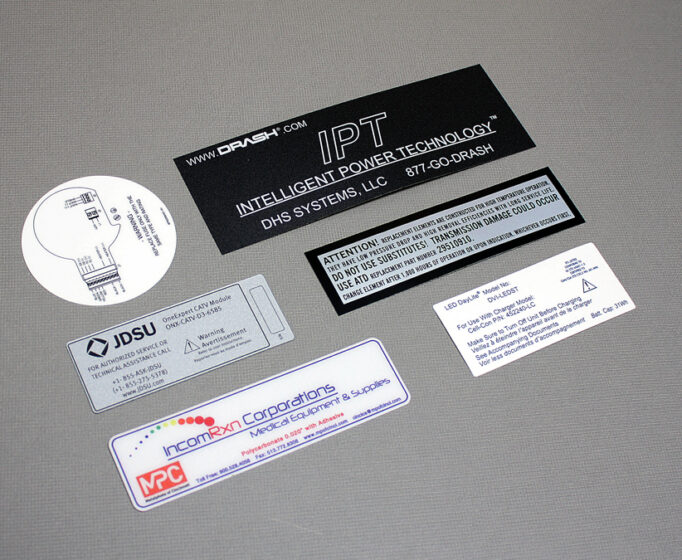Why Plastic Nameplates Are Essential for Modern Branding Strategies
Why Plastic Nameplates Are Essential for Modern Branding Strategies
Blog Article
Just How Plastic Nameplates Are Made: A Comprehensive Overview to Their Manufacturing Refine
The manufacturing of plastic nameplates entails a number of specific steps, starting from the selection of suitable materials to the final finishing touches. Each stage is critical, ensuring the item fulfills specific demands for sturdiness and appearances. Various manufacturing strategies play a significant function in crafting these nameplates. Comprehending these processes can clarify the complexities behind what may look like an easy product. What aspects contribute to the quality and modification of these nameplates?
Comprehending Plastic Materials Used for Nameplates

The Layout Process: From Idea to Model
The style process for plastic nameplates begins with a clear idea that guides the total creation. Designers team up with customers to define the purpose, style, and details demands of the nameplate. This preliminary phase consists of brainstorming sessions, laying out ideas, and selecting shades and fonts that line up with branding goals.Once the idea is developed, developers utilize computer-aided layout (CAD) software application to create in-depth electronic representations. These models permit for visualization and modifications before moving on. Feedback from stakeholders is integral during this stage, as it aids refine the style to satisfy expectations.After completing the digital model, a physical model may be created, commonly with methods like 3D printing. This substantial depiction makes it possible for additional evaluation of visual appeals and performance. In general, the layout process is a vital step that lays the foundation for the reliable manufacturing of high-quality plastic nameplates.
Cutting and Forming the Plastic
In the cutting and shaping phase of plastic nameplate production, the option of products plays a necessary duty in determining the last product's quality and longevity (Plastic Nameplates). Numerous accuracy cutting methods, such as laser cutting and CNC machining, warranty that the plastic is formed with accuracy and uniformity. This mix of careful product choice and progressed cutting techniques is crucial for generating premium nameplates

Product Selection Refine
Choosing the right material is essential for producing high-grade plastic nameplates. Numerous sorts of plastics are offered, each offering unique advantages and qualities. Common choices include acrylic, polycarbonate, and PVC. Acrylic is favored for its quality and UV resistance, making it perfect for exterior applications. Polycarbonate, understood for its resilience and influence resistance, appropriates for atmospheres that require improved defense. PVC is frequently selected for its cost-effectiveness and flexibility in style. The option process additionally takes into consideration factors such as color, surface, and thickness surface, which can significantly affect the final appearance and performance of the nameplate. Inevitably, the chosen material needs to line up with the meant use and aesthetic goals of the plastic nameplate.
Precision Trimming Strategies
While choosing the ideal product lays the groundwork, accuracy cutting methods play an essential role in shaping the plastic nameplates into their final types. Different techniques, consisting of laser cutting, CNC milling, and die cutting, are utilized to accomplish precision and consistency. Laser reducing makes use of concentrated light to produce intricate styles and tidy sides, ideal for intricate patterns. CNC milling offers flexibility by getting rid of excess product with accuracy, fitting various densities and forms. Die cutting, on the other hand, enables automation of uniform items, boosting performance. Each technique is picked based on the design requirements and the desired coating, guaranteeing that the last product satisfies quality criteria and customer assumptions while preserving durability and aesthetic charm.
Printing Strategies for Personalization
Exactly how can makers achieve vibrant and specific styles on plastic nameplates? The answer hinges on different printing methods customized for modification. Digital printing has actually obtained appeal as a result of its ability to generate high-resolution pictures and complex designs straight onto plastic surface areas. This method enables fast turn-around times and very little configuration costs, making it perfect for brief runs and individualized orders.Screen printing stays another extensively utilized method, especially for bigger quantities. It entails developing a pattern and using layers of ink, resulting in abundant colors and resilience. UV printing, which uses ultraviolet light to heal the ink, is also reliable, offering exceptional attachment and resistance to fading.Additionally, pad printing supplies versatility for irregularly shaped nameplates, enabling thorough layouts on challenging surface areas. These printing approaches allow makers to satisfy varied client requires while guaranteeing quality and longevity in their plastic nameplate products.
Surface Treatments and Finishing Options

Quality Assurance Steps in Manufacturing
Ensuring the greatest criteria of quality assurance during the production of plastic nameplates is crucial for maintaining item integrity and customer complete satisfaction. Manufacturers apply extensive examination methods at different stages of the production procedure. Raw materials go through complete testing to verify they fulfill specifications for resilience and color consistency. During the molding phase, automated systems keep an eye on criteria such as temperature and stress to stop defects.In addition, visual assessments are conducted to determine any surface area imperfections or misalignments. When the nameplates are produced, they are subjected to practical examinations, including adhesion examinations for published aspects and cardiovascular test for toughness. Quality assurance groups frequently use statistical tasting methods to evaluate batches, making certain that any inconsistencies from criteria are promptly attended to. This detailed approach not just improves product high quality however additionally fosters depend on with clients, attesting the maker's commitment to quality in every nameplate created.
Product packaging and Distribution of Finished Nameplates
The product packaging and circulation of finished plastic nameplates are important action in ensuring they get to customers in excellent problem. Various product packaging products are picked to safeguard the nameplates throughout transit, while delivering techniques are meticulously picked based upon performance and cost-effectiveness. Furthermore, effective storage options are carried out to maintain top quality until the nameplates are provided.
Product Packaging Products Utilized
Choosing ideal packaging materials is crucial to assure their defense during transportation when dispersing ended up plastic nameplates. Frequently utilized materials consist of bubble wrap, foam cushioning, and cardboard boxes, all created to support the nameplates against effects and shocks. Bubble cover provides a flexible obstacle, while foam cushioning assurances that nameplates remain firmly in location, decreasing the danger of scratches or breakage. In addition, sturdy cardboard boxes are made use of to have the nameplates, supplying structural support and defense from external components. Labels may be used to suggest taking care of instructions or breakable components, better boosting safety and security throughout transport. Generally, utilizing top notch product packaging materials considerably adds to the integrity and discussion of the completed plastic nameplates upon arrival at Read Full Article their location.
Delivering Methods Employed
Reliable circulation of ended up plastic nameplates counts on various shipping approaches that assure prompt and secure distribution. Firms commonly utilize copyright services, freight shipping, and postal services, depending upon the dimension, weight, and location of the packages. For neighborhood deliveries, copyright services provide rapid transit, making certain nameplates get to consumers quickly. For larger orders, freight shipping is favored, using vehicles or shipping containers to transfer mass amounts efficiently. Postal services helpful site work as an economical choice for smaller deliveries, particularly for domestic distributions. All shipping methods focus on safety packaging to stop damages during transit. Tracking systems are likewise made use of to keep track of deliveries, providing customers with real-time updates and reassurance concerning the status of their orders.
Storage Solutions Implemented

Frequently Asked Questions
What Kinds Of Businesses Commonly Make Use Of Plastic Nameplates?
Plastic nameplates are commonly used by numerous businesses, including workplaces, manufacturing facilities, hospitals, and schools. These nameplates serve crucial functions such as recognition, info screen, and branding, adding to organizational efficiency and professional look across diverse settings.
For how long Does the Entire Manufacturing Refine Take?
The manufacturing process period differs based upon complexity and quantity, normally ranging from a few days to numerous weeks. Variables affecting this timeline include design authorization, product availability, and production strategies employed by the company.
Can Plastic Nameplates Be Recycled After Use?
Plastic nameplates can be recycled, provided they are made from recyclable products. The schedule of recycling programs and regional guidelines may influence their recyclability. Proper disposal methods are necessary to assure reliable recycling.
What Are the Environmental Influences of Plastic Nameplate Manufacturing?
The ecological influences of plastic nameplate manufacturing include carbon emissions, resource depletion, and contamination from producing processes. Plastic Nameplates. In addition, inappropriate disposal adds to plastic waste, adversely affecting environments and wildlife, highlighting the demand for site sustainable methods
Are There Any Safety And Security Problems With Plastic Nameplates?
Safety issues pertaining to plastic nameplates largely include possible chemical direct exposure during manufacturing and the threat of products deteriorating gradually, which might lead to dangerous materials being released, affecting both human wellness and the atmosphere. While numerous materials can be utilized for nameplates, plastic stays a preferred option due to its convenience and sturdiness. In the cutting and forming stage of plastic nameplate production, the selection of materials plays a necessary function in figuring out the final item's quality and toughness. Selecting the right product is necessary for creating premium plastic nameplates. While choosing the proper material lays the groundwork, precision reducing strategies play a vital role in shaping the plastic nameplates right into their last types. When dispersing completed plastic nameplates, picking appropriate packaging products is vital to guarantee their protection throughout transit.
Report this page